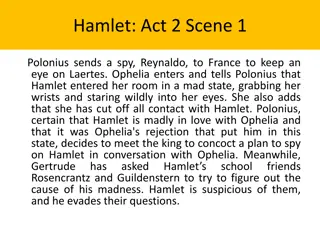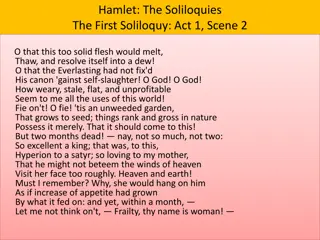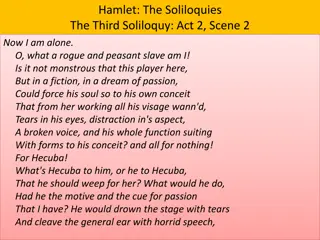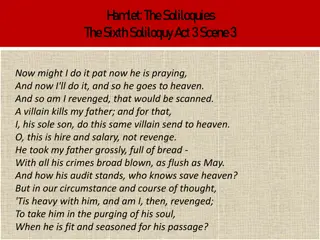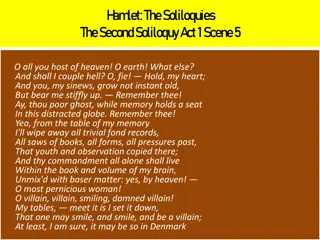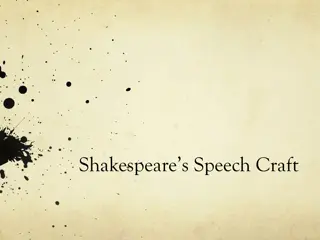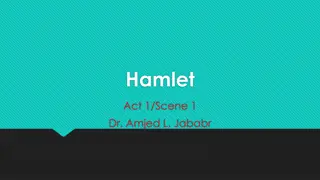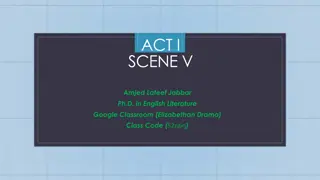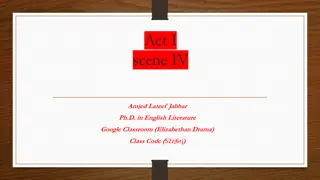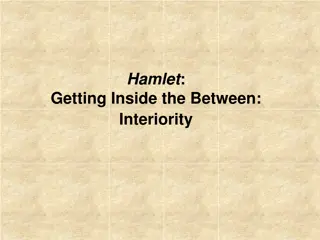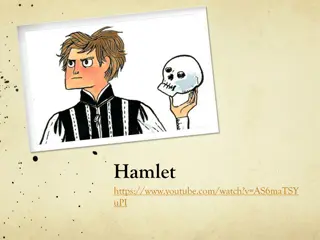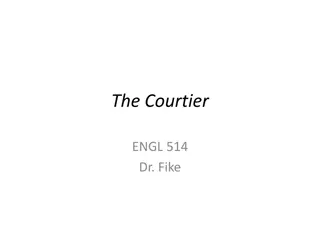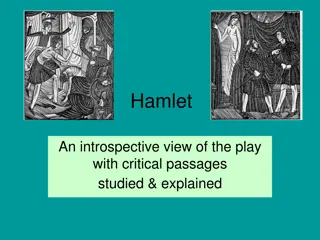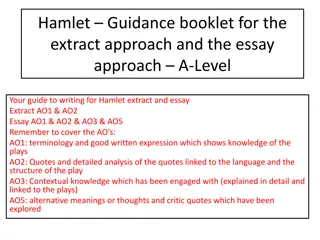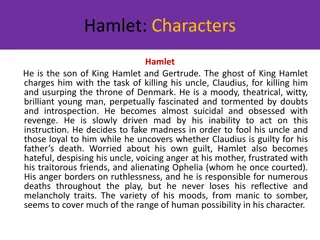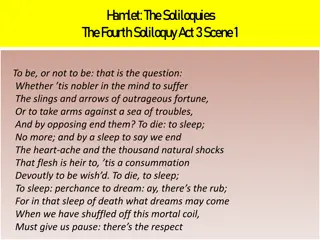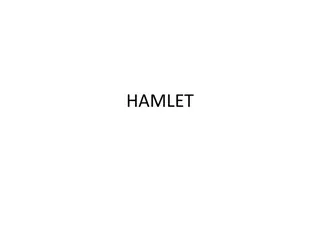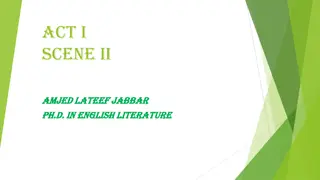Hamlet's Seventh Soliloquy: Reflections on Revenge and Inaction
Prince Hamlet reflects on the nature of revenge, his own inaction, and the contrast between his hesitation and the willingness of soldiers to die for trivial causes, ultimately resolving to be resolute and decisive in seeking retribution.
Download Presentation

Please find below an Image/Link to download the presentation.
The content on the website is provided AS IS for your information and personal use only. It may not be sold, licensed, or shared on other websites without obtaining consent from the author. Download presentation by click this link. If you encounter any issues during the download, it is possible that the publisher has removed the file from their server.
E N D
Presentation Transcript
H am let: The Soliloquies The Seventh Soliloquy A ct 4 Scene 4 How all occasions do inform against me And spur my dull revenge! What is a man If his chief good and market of his time Be but to sleep and feed? a beast, no more. Sure he that made us with such large discourse, Looking before and after, gave us not That capability and godlike reason To fust in us unused. Now, whether it be Bestial oblivion, or some craven scruple Of thinking too precisely on the event A thought which, quartered, hath but one part wisdom And ever three parts coward; I do not know Why yet I live to say 'This thing's to do'
H am let: The Soliloquies The Seventh Soliloquy A ct 4 Scene 4 Sith I have cause, and will, and strength, and means To do it. Examples, gross as earth, exhort me: Witness this army, of such mass and charge, Led by a delicate and tender prince. Whose spirit, with divine ambition puffed, Makes mouths at the invisible event. Exposing what is mortal and unsure To all that fortune, death, and danger dare, Even for an egg-shell. Rightly to be great Is not to stir without great argument, But greatly to find quarrel in a straw
H am let: The Soliloquies The Seventh Soliloquy A ct 4 Scene 4 When honour's at the stake. How stand I, then, That have a father killed, a mother stained, Excitements of my reason and my blood, And let all sleep? While, to my shame, I see The imminent death of twenty thousand men That, for a fantasy and trick of fame, Go to their graves like beds fight for a plot Whereon the numbers cannot try the cause, Which is not tomb enough and continent To hide the slain? O, from this time forth My thoughts be bloody, or be nothing worth!
H am let: The Soliloquies The Seventh Soliloquy A ct 4 Scene 4 Hamlet's seventh and last soliloquy is delivered in Act 4, Scene 4. The scene develops when Prince Hamlet, on his way to England, sees Fortinbras, who is leading his army through Denmark to capture some part of Poland, a small territory which, according to the captain, hath in it no profit, but the name. This little revelation induces Hamlet to ponder upon his inability to execute his father's revenge, even with sufficient motive and cause. Then Hamlet delivers this soliloquy, which is also his last.
H am let: The Soliloquies The Seventh Soliloquy A ct 4 Scene 4 The information given to Hamlet by the captain stimulates his thoughts of revenge and makes him scold himself for his inaction. He realizes that thousands of soldiers are ready to die for a piece of worthless land, but he, Hamlet, who is equipped with an excellent motive to take revenge for his father s death, is still unable to do anything about it.
H am let: The Soliloquies The Seventh Soliloquy A ct 4 Scene 4 This soliloquy sheds light on the fact that he has a natural deficiency that always thwarts his purpose. His tendency to generalize and universalize, to think instead of act, one that can be seen in his other soliloquies, is, once more, evident here also.
H am let: The Soliloquies The Seventh Soliloquy A ct 4 Scene 4 He tells himself that every person has a purpose and they should fulfill it. A man is no better than a beast if he is satisfied only with sleeping and feeding himself. God gave reason to human beings so that they may make use of it. He says that a man is justified in taking action if his sense of honor demands that he should, that he could find quarrel in a star i.e. accept the challenge, even if the provocation is far and distant.
H am let: The Soliloquies The Seventh Soliloquy A ct 4 Scene 4 Hamlet remembers his powerful motive with a father killed, a mother stained. These are the images that torture him. This is a turning point for Hamlet where he stops mulling over the past, licking his wounds, and fantasizing about revenge and instead, starts acting on his though
The E nd See you next time!








